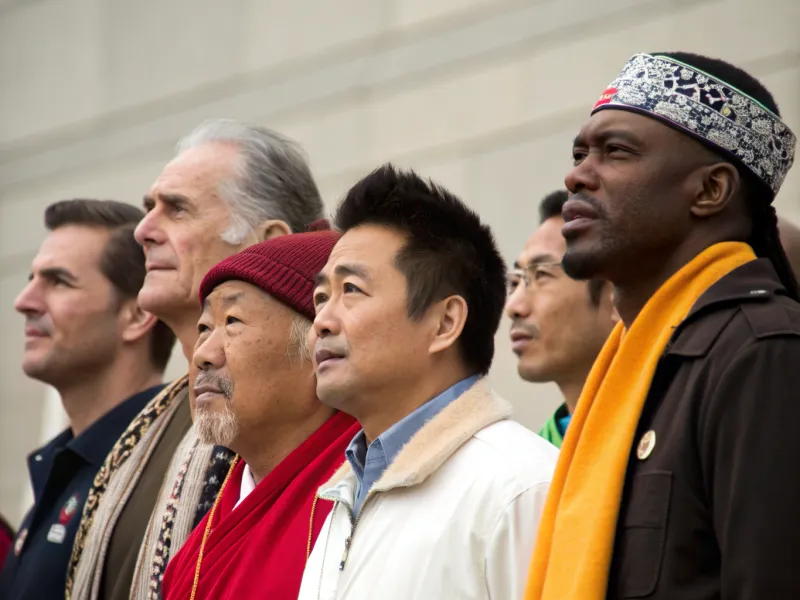33 Ways Feminism Challenges Toxic Masculinity
Feminism isn’t about making men less—it’s about making everyone more free.
Toxic masculinity pushes the outdated belief that “real men” must be tough, dominant, emotionless, and always in control. Sound exhausting? That’s because it is.
Feminism doesn’t just empower women—it frees men from impossible expectations, too. It says: You can be strong and sensitive. Protective and vulnerable. A leader without being controlling.
Toxic masculinity tells men to be hard, silent, and unfeeling. Feminism says: be human. Be whole. Be free.
This isn’t about erasing masculinity—it’s about elevating it. Creating space for a version that’s honest, kind, flexible, and strong in all the right ways. And when men are allowed to heal, feel, and lead with empathy?
Everybody wins.
Here are 33 ways feminism challenges toxic masculinity—and helps men reclaim their full humanity.
1. Feminism says emotions are human, not “feminine.”

Feminism gives men the freedom to feel without shame. As humans, emotions are natural, not bound by gender. Men crying or sharing their feelings doesn’t make them weak; it makes them human. It’s time we break free from the stereotypes that label emotions as a feminine trait.
Recognizing that emotions are universal helps men connect with others on a deeper level. It fosters empathy and understanding, allowing men to live more authentic lives. By embracing emotions, men can experience genuine happiness and fulfillment. Feminism’s message is clear: emotions are for everyone.
2. It challenges the lie that strength = silence.

The old notion that men must remain silent to be strong is outdated. Feminism encourages men to speak up about their pain, vulnerabilities, and struggles. True strength is found in honesty and openness, not in silence. When men share their experiences, it fosters community and connection.
It shows others that they are not alone. Feminism teaches that vulnerability is an asset, not a weakness. By breaking the silence, men can heal and grow. This change in perspective empowers men to live their truth and find inner peace.
3. It unpacks the myth that men must always “provide.”

The pressure for men to be the sole providers is a heavy burden. Feminism advocates for shared responsibilities and mutual respect in relationships. Providing isn’t just about finances; it encompasses emotional and domestic support. By breaking this myth, men can engage more fully with their families.
It allows for genuine partnerships where both partners contribute equally. This balance creates healthier and happier homes. Men are not just providers; they are nurturers, friends, and partners. Feminism redefines providing as a shared journey, making life more fulfilling for everyone involved.
4. It dismantles the idea that men must dominate to matter.

Dominance isn’t a prerequisite for significance. Feminism fosters a mindset where collaboration and equality are valued over control. Men don’t need to dominate others to prove their worth. Instead, embracing cooperation enhances relationships and personal growth.
Power with others is far more empowering than power over others. This shift encourages men to build connections based on mutual respect and understanding. It allows for authentic relationships where everyone’s voice is heard. Feminism shows that significance comes from who you are, not who you control.
5. It gives men permission to be soft.

Tenderness and softness are strengths, not flaws. Feminism encourages men to embrace their gentle side without fear of judgment. Showing kindness and compassion doesn’t diminish masculinity; it enhances it. By allowing softness, men can foster deep connections and lasting friendships.
It’s a reminder that strength doesn’t always mean hardness. In moments of vulnerability, true character shines. Men can be both strong and soft, creating a balance that enriches their lives. Feminism’s message is clear: softness is a valuable and powerful trait.
6. It rejects “boys will be boys” as an excuse for bad behavior.

The outdated excuse of “boys will be boys” no longer holds. Feminism demands accountability and responsibility from everyone. Misbehavior shouldn’t be excused due to gender. By rejecting this cliché, we can raise boys who understand the importance of respect and consideration.
It encourages a mindset where actions have consequences, promoting growth and maturity. Boys are taught to be responsible for their behavior, leading to healthier relationships and communities. Feminism helps redefine what it means to be a good man, focusing on integrity and respect.
7. It promotes healthy masculinity, not no masculinity.

Feminism isn’t anti-masculinity; it’s about redefining it. Healthy masculinity embraces traits that contribute positively to society. This includes respect, empathy, and kindness. Men can be masculine without being harmful to themselves or others.
By promoting a balanced view of masculinity, feminism encourages men to explore their identities freely. It’s about finding strength in character rather than physical prowess. Healthy masculinity is inclusive and adaptable, allowing men to express themselves authentically. Feminism provides a space where men can grow into their best selves.
8. It normalizes men asking for help.

Seeking help is a sign of strength, not weakness. Feminism normalizes men reaching out for support when needed. Mental health doesn’t discriminate based on gender. By encouraging men to ask for help, feminism breaks down barriers of isolation and stigma.
Whether it’s seeking therapy or leaning on friends, help is a vital tool in navigating life’s challenges. It promotes a culture where vulnerability is celebrated, and healing is possible. Men are reminded that they don’t have to face struggles alone. Support is always available.
9. It questions why men are raised to suppress their feelings.

Why are men taught to bottle up their emotions? Feminism challenges this harmful narrative. Suppressing feelings leads to isolation and mental health issues. By questioning societal norms, feminism encourages emotional expression for all genders.
It promotes open conversations and emotional literacy, allowing men to communicate their needs and desires. This change fosters healthier relationships and personal growth. Men learn that it’s okay to be vulnerable and expressive. Feminism creates an environment where feelings are valid, and emotional well-being is prioritized.
10. It empowers men to build deeper, more vulnerable relationships.

Feminism encourages men to connect on a deeper level. Traditional masculinity often limits emotional expression, leading to surface-level relationships. By embracing vulnerability, men can form genuine connections based on trust and understanding.
These relationships thrive on openness and honesty, providing emotional support and companionship. Feminism empowers men to break away from superficial interactions, fostering bonds that are meaningful and lasting. By prioritizing depth over appearance, men can experience the joys of true friendship and partnership.
11. Feminism encourages self-reflection, not self-denial.

Self-reflection is a path to personal growth. Feminism encourages men to look inward and engage in honest self-assessment. This reflection allows for positive change and development. Denying one’s true self only leads to frustration and dissatisfaction.
By promoting self-awareness, feminism enables men to embrace their strengths and work on their weaknesses. It’s about understanding who you are and what you want to become. Self-reflection fosters authenticity, leading to a more fulfilling life. Feminism’s message is to know yourself and be true to who you are.
12. It fights against shame around male survivors of abuse.

Male survivors of abuse deserve healing and support. Feminism works to break the stigma surrounding male victimhood. It’s crucial to acknowledge and validate their experiences without shame. By addressing this issue, feminism promotes a culture of empathy and understanding.
Survivors are encouraged to seek help and share their stories, fostering healing and resilience. This opens doors to recovery and empowerment. No one should suffer in silence; everyone deserves compassion and care. Feminism stands with male survivors, advocating for their rights and dignity.
13. It redefines intimacy.

Intimacy is more than just physical connection. Feminism broadens the definition, emphasizing emotional and mental closeness. Men can experience rich, fulfilling relationships without the pressure to perform physically. By focusing on communication and understanding, couples can build lasting bonds.
This perspective allows for deeper connections and genuine companionship. Feminism encourages exploring all aspects of intimacy, including trust, respect, and empathy. It fosters relationships where partners are truly seen and valued for who they are. Intimacy becomes a shared journey rather than a singular act.
14. It calls out xenophobia, which often hides inside toxic masculinity.

Xenophobia is a symptom of toxic masculinity. Feminism challenges this prejudice by promoting acceptance and inclusivity. It’s about embracing all expressions of gender. By calling it out, feminism fosters a society where everyone is free be themselves. This shift leads to healthier, more accepting communities.
Men are encouraged to support everyone’s rights, breaking down barriers of discrimination. Acceptance and empathy replace fear and ignorance. Feminism’s message is clear: everyone deserves respect and equality.
15. It says fatherhood is about presence, not just provision.

Being a father isn’t just about providing financially. Feminism highlights the importance of emotional presence and involvement. Children need fathers who are active participants in their lives. By prioritizing presence, fathers can form meaningful connections with their children.
It allows for shared experiences and memories, fostering trust and love. Feminism encourages fathers to be there emotionally, not just materially. This approach creates a nurturing environment where children thrive. Fatherhood becomes a fulfilling and enriching experience for both parent and child.
16. It allows men to explore their identities without fear.

Identity exploration is a fundamental human right. Feminism provides a safe space for men to discover who they are without judgment. It challenges rigid definitions of masculinity, allowing for diverse expressions and interests.
Men can explore different aspects of themselves, from hobbies to career paths, without fear of ridicule. This freedom encourages personal growth and self-discovery. By embracing individuality, men can lead more authentic and satisfying lives. Feminism’s message is simple: be yourself, whoever that may be, and live without fear.
17. It challenges violent role models.

Violence and aggression are not synonymous with masculinity. Feminism questions the glorification of violent role models, advocating for emotionally intelligent leaders instead. It’s time to redefine heroism as compassion, understanding, and empathy. By promoting positive role models, feminism fosters a culture where violence is not idolized.
Men are encouraged to lead with kindness and respect. This change helps create safer communities and healthier relationships. Feminism’s message is clear: strength lies in empathy, not aggression, and true leaders uplift rather than oppress.
18. It unpacks why so many men feel pressure to “man up.”

The pressure to “man up” is a societal trap. Feminism unpacks this harmful expectation, showing that vulnerability is not a weakness. Men are encouraged to defy traditional gender norms and express their true selves. By rejecting this pressure, men can live more authentically and experience emotional freedom.
This perspective promotes mental well-being and self-acceptance. It’s about embracing all facets of one’s identity without the fear of judgment. Feminism offers a safe space for men to be themselves, free from outdated stereotypes and expectations.
19. It encourages active listening, not control.

Active listening is a cornerstone of healthy communication. Feminism promotes this skill, encouraging men to listen with empathy and understanding. Control and dominance are replaced with respect and curiosity. By practicing active listening, men can build stronger, more meaningful relationships.
It fosters an environment where everyone’s voice is valued and heard. This approach enhances personal connections and resolves conflicts. Feminism’s message is that genuine communication involves listening as much as speaking. It’s about creating dialogue, not monologue.
20. It removes the stigma around men doing “feminine” things.

Feminism dismantles the cultural stigma surrounding men engaging in activities labeled as “feminine.” Yoga, baking, or even enjoying pop music shouldn’t be dictated by gender. Men are free to explore interests that bring them joy and fulfillment. By breaking down these barriers, feminism allows for a more inclusive and diverse world.
Men can express themselves without the fear of ridicule or judgment. This acceptance fosters creativity and personal growth, enriching lives in unexpected ways. Feminism celebrates individuality and encourages everyone to pursue their passions.
21. Feminism supports men being caregivers, stay-at-home dads, nurturers.

Caregiving is a role for everyone, not just women. Feminism supports men in being nurturing and attentive parents. Stay-at-home dads and male caregivers are valuable and respected. By redefining gender roles, feminism creates opportunities for men to fully engage in family life.
This shift allows men to develop strong bonds with their children and partners. It fosters environments where love and care are paramount. Men are encouraged to embrace these roles without fear of societal judgment. Feminism values caregiving as a powerful and important contribution.
22. It promotes emotional literacy.

Understanding emotions is key to personal growth. Feminism promotes emotional literacy, teaching men how to recognize, name, and manage their feelings. This skill empowers men to communicate effectively and build stronger relationships. By fostering emotional intelligence, feminism breaks down barriers of misunderstanding and conflict.
Men learn to express themselves clearly and empathetically, enhancing personal and professional interactions. Emotional literacy becomes a tool for self-awareness and growth, leading to a richer and more fulfilling life. Feminism’s message is about understanding oneself and others on a deeper level.
23. It redefines leadership as collaboration, not domination.

Leadership doesn’t require domination. Feminism redefines it as a collaborative effort, emphasizing teamwork and mutual respect. Men are encouraged to lead by example, fostering environments where everyone’s contributions are valued.
This approach builds trust and unity, leading to more effective and innovative outcomes. By embracing collaboration, men can inspire and empower others, creating a culture of inclusion and equality. Feminism’s message is clear: true leadership uplifts, encourages, and supports. It’s about working together, not ruling over others.
24. It invites men into equality, not competition.

Equality isn’t a competition; it’s a shared journey. Feminism invites men to join in the pursuit of equality, fostering a sense of partnership rather than rivalry. By working together, we can achieve societal change that benefits everyone. Men are encouraged to support women’s rights, recognizing that equality enhances all lives.
This collaborative approach creates a more harmonious and prosperous society. Feminism isn’t about superiority; it’s about equality for all. Men and women standing together, side by side, moving towards a better future.
25. It pushes back on “real men don’t…” culture.

The “real men don’t…” mindset is limiting and outdated. Feminism challenges these stereotypes, encouraging men to be true to themselves. Whether it’s wearing pink, crying, or discussing therapy, real men do all of it. By rejecting narrow definitions of masculinity, feminism creates space for authenticity and individuality.
Men are free to explore their identities without fear of judgment. This shift allows for personal growth and self-expression, fostering a more inclusive and understanding society. Feminism’s message is simple: be who you are, without restrictions.
26. It addresses toxic masculinity in schools, sports, media.

Addressing toxic masculinity requires education and awareness. Feminism tackles this issue in schools, sports, and media, promoting healthier representations of masculinity. By educating the younger generation, we can prevent the perpetuation of harmful stereotypes.
Students learn to question and challenge toxic ideals, fostering a culture of respect and equality. In sports, respect and teamwork replace aggression and dominance. Media representations become more diverse and inclusive. Feminism aims to create a world where everyone is valued and respected, regardless of gender.
27. It says you don’t need to earn love through status or power.

Love isn’t earned through status or power. Feminism teaches that self-worth isn’t tied to external achievements. Everyone deserves love simply for being human. By rejecting the notion that love must be earned, feminism promotes self-acceptance and authenticity.
Men are encouraged to seek relationships based on mutual respect and understanding. This perspective fosters genuine connections, free from superficial expectations. Feminism’s message is that true love is about presence, not prestige. It’s about being valued for who you are, not what you have.
28. It challenges rape culture and the objectification of women.

Rape culture and objectification harm everyone. Feminism actively challenges these issues, advocating for respect and consent in all interactions. Men are encouraged to understand and challenge harmful behaviors and attitudes. By promoting empathy and understanding, feminism fosters safer and more respectful communities.
It’s about building relationships based on mutual respect and dignity. By addressing these issues, feminism creates a world where everyone feels safe and valued. This change benefits society as a whole, creating a more inclusive and equitable environment for all.
29. It teaches that masculinity and empathy can coexist.

Empathy is not reserved for women. Feminism teaches that masculinity and empathy can coexist harmoniously. Men are encouraged to embrace empathetic traits, enhancing their relationships and personal growth. By fostering empathy, men can better understand and connect with others.
This perspective allows for deeper, more meaningful interactions. It’s a reminder that masculinity isn’t diminished by compassion; it’s enriched by it. Feminism promotes a balanced view of masculinity, where empathy and strength coexist. This change leads to healthier and more fulfilling lives.
30. It gives men the freedom to stop performing.

The pressure to constantly perform is exhausting. Feminism gives men the freedom to be themselves without the burden of societal expectations. By letting go of the need to always be “on,” men can find rest and rejuvenation. This freedom allows for genuine self-expression and authenticity.
Men can pursue their passions and interests without fear of judgment. Feminism encourages a life where men can be fully present, embracing who they are without constraints. This liberation leads to a more balanced and satisfying life, free from performative demands.
31. Feminism opens doors to emotional connection.

Emotional connection is a vital aspect of human relationships. Feminism encourages men to open up and connect on a deeper emotional level. By breaking down barriers, men can form genuine bonds based on trust and understanding. These connections foster a sense of belonging and support, enriching lives in profound ways.
Feminism promotes a culture where emotional vulnerability is celebrated, not shamed. It’s about creating spaces where men can be themselves, free from judgment. This shift leads to healthier, more fulfilling relationships that stand the test of time.
32. It gives permission to question harmful traditions.

Traditions can be comforting, but not all are beneficial. Feminism encourages men to question and challenge outdated practices. By examining these traditions, men can make informed decisions about what aligns with their values. This perspective promotes growth and change, allowing for a more inclusive and equitable society.
Men are empowered to say, “That doesn’t work for me,” and seek alternatives that resonate with their beliefs. Feminism fosters an environment where questioning is encouraged, leading to positive change and progress. It’s about creating a future that reflects modern values.
33. It helps men become better—not less.

Feminism isn’t about diminishing men; it’s about helping them grow into their best selves. By challenging toxic masculinity, feminism promotes personal development and growth. Men are encouraged to embrace change and seek continuous improvement. This perspective fosters resilience, adaptability, and empathy.
It’s about becoming better partners, fathers, friends, and humans. Feminism provides tools for self-awareness and growth, leading to a more fulfilling and meaningful life. It’s a reminder that being better isn’t about being less; it’s about being more of who you are meant to be.







